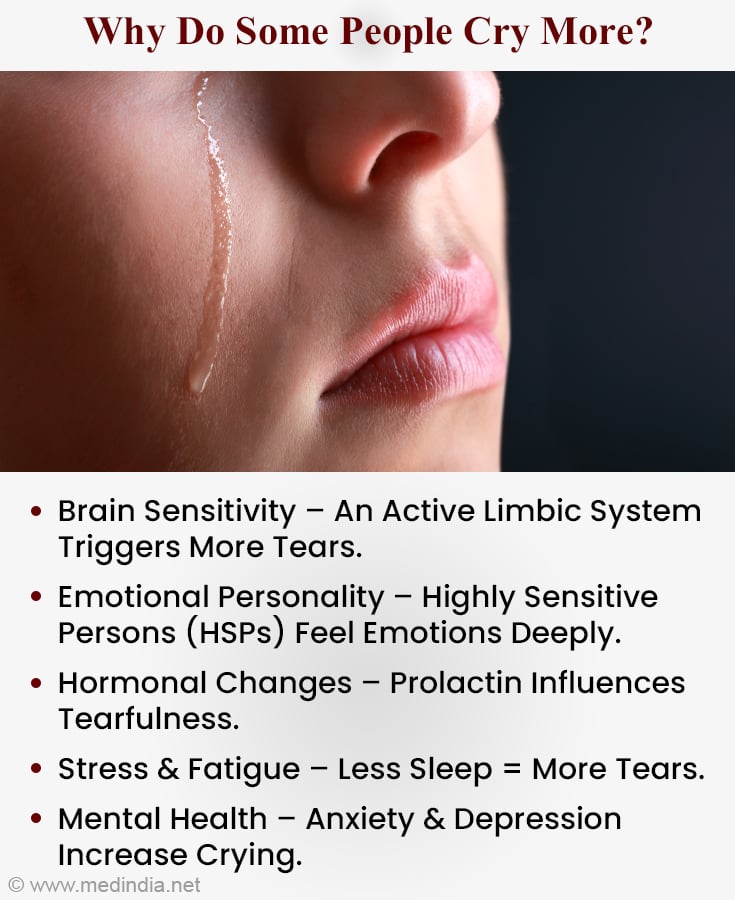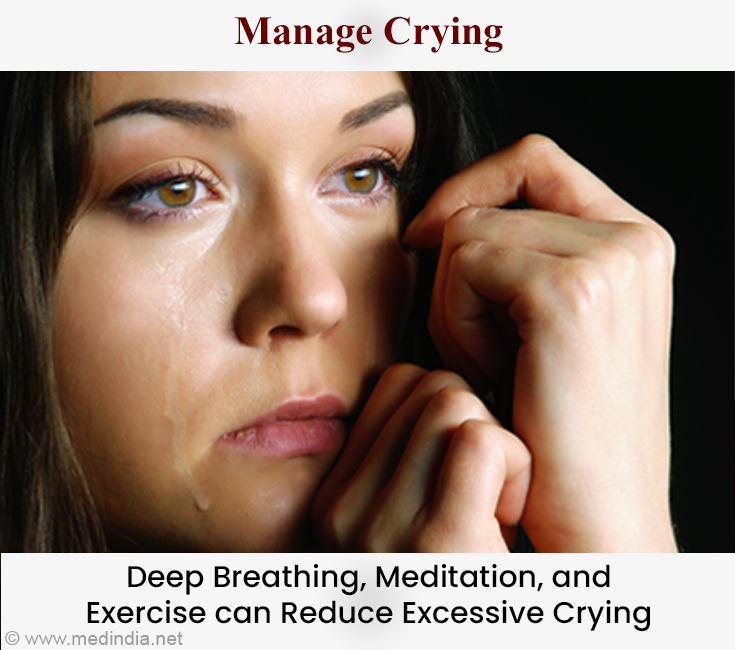- Crying - (https://my.clevelandclinic.org/health/articles/crying)
About
Crying is a natural emotional response, often triggered by pain, anxiety, or overwhelming emotions. While some individuals rarely shed tears, others find themselves crying at the slightest provocation. This difference can lead to self-doubt, making some wonder if they are emotionally weaker than others. However, the truth is far more complex—crying easily is influenced by multiple factors, including brain function, personality, societal expectations, and mental health. Understanding these influences can help normalize emotional sensitivity and encourage better emotional well-being(1✔ ✔Trusted Source
Crying
Go to source).
Did You Know?
The hormone prolactin, found in higher levels in women, may contribute to increased crying tendencies! #mentalhealth #medindia
The Science Behind Tears: Why Do Some People Cry More?
Brain Structure and Emotional Sensitivity
The limbic system, responsible for regulating emotions, plays a crucial role in determining how strongly a person reacts to emotional stimuli. Some individuals have a more active limbic system, leading to heightened emotional sensitivity. This means they may feel emotions more intensely and express them through tears more frequently than others.
Personality Traits and Crying
Certain personality types, particularly Highly Sensitive People (HSPs), are more prone to frequent crying. HSPs process emotions deeply, leading to greater empathy, creativity, and awareness of subtle changes in their environment. However, this emotional intensity can also make them more susceptible to feeling overwhelmed, resulting in tears.

How Life Experiences and Society Influence Crying
Childhood Experiences and Emotional Expression
Early life experiences shape how individuals express emotions. Those raised in environments where feelings were acknowledged and validated may be more comfortable crying in adulthood. Conversely, people who grew up in households where emotions were suppressed may struggle with regulating their emotional responses, leading to either excessive crying or emotional numbness.
Societal Expectations and Gender Norms
Cultural norms significantly impact how people express their emotions. Historically, women have been perceived as more emotionally expressive, while men are often expected to suppress their feelings to maintain a sense of strength. This social conditioning can make some individuals feel uncomfortable or ashamed of crying, leading to further emotional distress.
When Crying May Indicate an Underlying Health Concern
Mental Health and Emotional Regulation
Frequent crying may sometimes be linked to underlying mental health conditions such as anxiety or depression. Individuals with anxiety disorders often experience heightened emotional responses, making them more likely to cry. Similarly, depression can lead to unexplained crying spells, even when sadness is not the primary emotion.
Common symptoms of anxiety include:
- Persistent worry or fear
- Restlessness
- Muscle tension
- Sleep disturbances
- Difficulty concentrating
Depression symptoms may include:
- Prolonged sadness or emptiness
- Low energy or motivation
- Changes in appetite or sleep patterns
- Loss of interest in activities
- Thoughts of self-harm or suicide
If excessive crying is accompanied by these symptoms, seeking professional help can be beneficial.

Other Factors That Influence Crying
Hormonal Fluctuations and Their Role in Crying
Hormones play a vital role in emotional regulation. Prolactin, a hormone linked to lactation, also influences emotional tears. Higher levels of prolactin in both men and women can contribute to increased crying tendencies. Additionally, hormonal changes during menstruation, pregnancy, menopause, or while taking hormonal contraceptives can lead to heightened emotional sensitivity and unexpected tears.
The Impact of Stress and Sleep Deprivation
Stress and lack of sleep can lower emotional resilience, making it harder to manage emotions effectively. Sleep deprivation impairs brain function, leading to difficulties in regulating emotions and responding to challenges. High stress levels can also cause irritability and frustration, often resulting in increased tearfulness.
Crying is a natural and important emotional response influenced by neurological, psychological, hormonal, and social factors. While occasional crying can be therapeutic, frequent or uncontrollable crying may indicate underlying concerns that need attention. Understanding the reasons behind emotional sensitivity can help individuals navigate their emotions more effectively. If crying begins to interfere with daily life, consulting a mental health professional may provide valuable guidance for emotional well-being.
Remember: Crying is not a weakness-it is a reflection of emotional depth and sensitivity. Acknowledging and understanding emotions is key to maintaining a balanced and healthy mindset.









